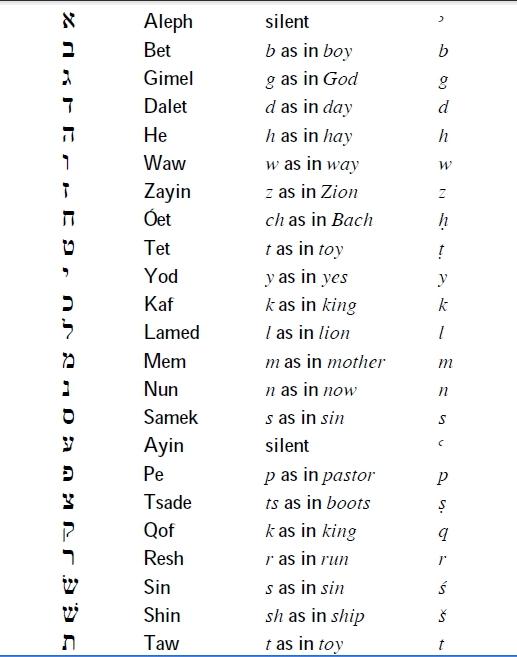
Welcome to the Biblical Hebrew (Self-Taught) Study Group
I am Pastor Ed Rice, this is a Beta Study Group. For the improvement of this process, your input is solicited. Pastor-Rice@GSBaptistChurch.com
IMPORTANT RESCOURCE www.gsbaptistchurch.com/hebrew_study_group/hebrew_journal.pdf
| Lesson 1 Week 1 - The Hebrew Alphbet Memorize the Hebrew Alphbet at www.gsbaptistchurch.com/hebrew_study_group/Overheads/Chp01_OH.pdf (before downloading, storing or printing this pdf you should buy the copyright from “Basics of Biblical Hebrew” by Gary D. Pratico and Miles V. Van Pelt surely found at amazon.com and worth every penny) (you are free and encouraged however to make a hand copy for your record, that would be free from copyright violations and very educational besides.) See the Hebrew Alphbet at www.gsbaptistchurch.com\hebrew_study_group\alphbet.jpg Hear the Hebrew Alphbet at www.gsbaptistchurch.com\hebrew_study_group\alpha_slow.mp3 Try that a little faster at www.gsbaptistchurch.com\hebrew_study_group\alpha_fast.mp3 Writing things down is essential to learning Worksheet0101.pdf Helpful Flash Cards via 3x5 3x5hbrw00.jpg 3x5hbrw01.jpg alphbet.png Helpful movie files hbrw_alphbet.wmv hbrw_alphbet_fast.wmv Helpful movie files of Scripture Readings hbrw_gen1_1.wmv hbrw_jonah2_1.wmv See the Hebrew Bible's Psalms 1-2 and begin pronouncing Hebrew words psalm1n2.jpg I have and recommend “Biblia Hebraica Stuttgarrensia”, second edition, amended 1977, copy right 1991 from The Bible Society in Israel. Visit the free-eteacher site http://eteacherbiblical.com/free-lessons and do the first free lesson (NO LONGER FREE!). |
Much can be said about why one should learn Biblical Hebrew and I expect that you will say it in the next few weeks. I will then incorporate your input into this paragraph. I have found its study awesome and enlightening. God wants us to know Hebrew. Exodus 16:15 states “And when the children of Israel saw it, they said one to another, It is manna: for they wist not what it was. And Moses said unto them, This is the bread which the LORD hath given you to eat.” In this verse we learn the Hebrew word “manna” and its definition “What is it?” You will be amazed how much Hebrew you already know, and amazed how challenging it is to master a Hebrew Alphbet. But it is worth the effort.
Below please find a group of links that provide the material for the 2nd two weeks of our effort. We must first learn the Hebrew Alphbet and this is our initial focus. The best way I found to memorize the Alphbet then do this is just like the first grader does it; get out your Hebrew Bible open it (from the back, remember) to Psalms and begin reading Psalm 1:1. You will need to do this one letter at a time, looking up the sound of letters you do not recognize, and struggling to pronounce each word like a first grader does. Here we go.
IMPORTANT RESOURCE http://eteacherbiblical.com/free-lessons (NO LONGER FREE!).
| Lesson 2 Week 3 Hebrew Vowels Memorize the Hebrew Vowles www.gsbaptistchurch.com/hebrew_study_group/Overheads/Chp02_OH.pdf Writing things down is essential to learning Worksheet0201.pdf Helpful Flash Cards via 3x5 3x5hbrw02_vowles.jpg alphbet.png Helpful Foldable Flash Cards via Open Office odt 3x5s_chap1n2.odt Helpful movie files of Scripture Readings hbrw_zech8_11to12.wmv hbrw_zech8_16to17.wmv See the Hebrew Bible's Psalms 3-5 and begin pronouncing Hebrew words psalm3n4n5_7.jpg Visit the free-eteacher site http://eteacherbiblical.com/free-lessons and do the second and third free lesson. (NO LONGER FREE!). A 9 page background paper hbrw101.odt or hbrw101.pdf Typing your own Hebrew with BSTFont and Psalm25:14 bsthebre.ttf hbrw_fun_with_psa24_14.odt |
Two things are almost essential for your participation in this self-study-group. First is a Hebrew Bible. I do not know what cautions to put forth here, but expect to before we finish the year. I have and recommend “Biblia Hebraica Stuttgarrensia”, second edition, amended 1977, copy right 1991 from The Bible Society in Israel. You may find an online version which uses all the vowel points but I have not, and tire from reading a computer screen.” Secondly, we will be following Gary D. Pratico and Miles V. Van Pelt's “Basics of Biblical Hebrew”, surely available via amazon.com at some exorbitant price, and worth every penny. There is a CD in that book that has the chapter reviews that I will be sending out. Your ownership of them and the copyright violation barometer level will depend on your buying the book. That CD also contains an excellent computer flashcard vocabulary software program called Teknia that is very effective. Buying these two items is optional but worth the investment for the serious student.
My three fold plan for this study group is to 1) make all lesson material available online, 2) find some means of weekly encouraging communication and feedback via email, chat, emeeting, or blog, (I can start via email, see #3 below) 3) enlist participants help to make this beta-study-group efficient and effective. So let's do it.
IMPORTANT RESOURCE Thurs 8pm EST webinar https://eteacher.webex.com/ (NO LONGER AVAILABLE!).
| Lesson 3 Week 5 Hebrew Syllabification Learn Hebrew Syllabification www.gsbaptistchurch.com/hebrew_study_group/Overheads/Chp03_OH.pdf Read approx 6 verses of Hebrew a day pronouncing each word as best you can. Reading Psalms from your Hebrew Bible is best but here are the first 4 for those who do not have a Hebrew Bible yet: www.gsbaptistchurch.com\hebrew_study_group/psalm1n2.jpg www.gsbaptistchurch.com/hebrew_study_group/psalm3n4n5.jpg For our very first vocabulary lesson learn the 20 Hebrew Words in this worksheet: www.gsbaptistchurch.com/hebrew_study_group/vocab_ch3.odt or www.gsbaptistchurch.com/hebrew_study_group/vocab_ch3.pdf or www.gsbaptistchurch.com/hebrew_study_group/vocab_ch3.jpg Again helpful movie files of Students doing Scripture Readings are found at www.gsbaptistchurch.com/hebrew_study_group/scripture\index.html Please visit the free-eteacher site http://eteacherbiblical.com/free-lessons and complete all 10 free lesson. (NO LONGER FREE!). |
Learning to Read Biblical Hebrew,
Ed's Journal
by Pastor Edward Rice
Copyright © 2013 by Pastor Edward Rice English Scripture quotations are taken from the Authorized King James Bible.My journey into Biblical Hebrew is journaled here with the expectation that my children and my children's children will soon walk this path. Only loving the Lord their God with all their heart, with all their soul, and with all their mind would take them down such a path. I have no greater joy than to know that my children walk in truth.
IMPORTANT RESOURCE Hebrew Newletter (NO LONGER AVAILABLE!). http://news.eteacherbiblical.com/
| Lesson 4 Week 7 Hebrew Nouns Learn Hebrew Nouns www.gsbaptistchurch.com/hebrew_study_group/Overheads/Chp04_OH.pdf For our very first vocabulary lesson learn the 20 Hebrew Words in this worksheet: vocab_ch4.odt or vocab_ch4.pdf or vocab_ch4.jpg Again use helpful movie files of Scripture Readings at scripture\index.html Visit the free-eteacher site http://eteacherbiblical.com/free-lessons and do all 10 free lesson. (NO LONGER FREE!). Reading 6 verses of Hebrew a day pronouncing each word as best you can. Is an important key to learning and growing an ability to recognize pursue the Hebrew Language. Less is less. Reading Psalms from your Hebrew Bible is best but here are the first 4 for those who do not have a Hebrew Bible yet: Psalm1n2.jpg Psalm3n4n5.jpg |
Acknowledgments
Preface (unsubmitted as yet)
Learning to Read Biblical Hebrew
Ed's Journal
by Pastor Edward Rice
Romans 3:1-2 What advantage then hath the Jew? or what profit is there of circumcision? Much every way: chiefly, because that unto them were committed the oracles of God.
Learning Hebrew language enough to read a Hebrew Bible will be a challenge. A challenge for challenge sake is great for 6 year olds. For the more mature there needs to be a greater purpose in taking on such challenge. Since your reading this one needs to word why one would, but first consider the challenge as it lies ahead.
Hebrew is intriguing in that it is made up of letters which are very foreign to English, and that these 23 foreign letters are all consonants. Additional consternation is encountered by some when they consider that in Hebrew letters are often given duo syllable names “Aelp – Bet – Gimel” and “Ayin- Pe – Tsade, while in English our letters are straight forward one syllable names “A-B-C” and “Q-R-S”. The first challenge then is to learn these letters, learn their names, and learn their sounds. This is not a new challenge. We faced it previous. It was in first grade when the letters were “A-B-C”. Memorize these letters just like you did back then, it will take your mind to a new but familiar vista.
The letters are best learned via this flash card:

Take yourself back to first grade, read them write them, memorize them and learn them. Why are there 24? When there are supposed to be 23? Oh the intrigue of learning.
Another flash card that is just as functional is given here.
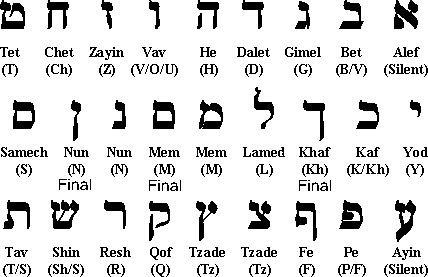
Here it is useful to consider that Hebrew reads from right to left, not in our normal English flow. Notice that here?
You are, again, challenged to do some rote memorization without understanding all the details. Do not repeat the childish question “Why do I have to learn this?” That is childish! The more mature question is Why am I learning to read Hebrew?
When a teenager I was told that Psalm 119 was a Hebrew acrostic with groups of 8 verses all starting with the 23 letters of the Hebrew alphbet.1 My Oxford press Scofield Bible even went to the great care of printing the Hebrew letters before each octet. I was intrigued enough then to know that someday I would learn all those queer shapes with strange names and check this hypothesis out with an actual Hebrew Bible. I first learned the Hebrew alphbet by reading my King James Bible, and pausing twice a year in Psalm 119.
Since inception the study of Biblical languages was constitute as a fundamental and significant part of the training of the human intellect. The prideful arrogance of the post-modernist student who thinks English is the perfected end-all of every language might need be addressed here, but only briefly. One Dr. Peter Ruckman and his followers have championed a misguided cause that the English is far superior to the original languages, making anyone who knows, uses or learns the originals an inferior turncoat and hypocrites who threatens their KJV only stance. It is unfortunate that so many independents with a mysterious draw to isolationism echo his refrain It needs to be clearly stated that study of the Greek and Hebrew cannot greatly improve or enhance what we have recorded in the King James English, but we must not shy away with from their insults and threats to make such study insignificant.
In 1999 my Greek professor Rodney Decker wrote inside my Greek TR, “The Biblical Languages, Greek and Hebrew are the sheath in which the sword of the Spirit rests.” Mere modernist humans will never improve on the King James English Bible translation or Bible language. It should never come from a preachers mouth “A better translation is ...” The team of translators assembled by King James will never be equaled, and when some scholar who got a B+ in 2 years of Greek tries to change English words of the King James Bible just back away from them slowly. So I must clarify that we do not learn Hebrew so that we can improve the King James English, however our learning of Greek and Hebrew can most certainly improve our King James English even as it increases our faith in the King James translators.
Three reasons I have considered for learning to read my Hebrew Bible are 1) I love the Lord my God and he first spoke to humanity in Hebrew. 2) I love the revelation of the Lord my God and 39 books of His written revelation were recorded in Hebrew, and 3) I love to learn new things believing that when you stop learning your brain starts aging and God commands us to Study to shew yourself approved unto a God a workman that needeth not be ashamed, rightly dividing the word of truth. Given those three, just for starter reasons one should walk into this learning experience with anticipation that more concrete reasons will soon develop.
On that note, learn your Hebrew alphbet. Use the resources listed below to be a help for that learning process.alpha_slow.mp3, alpha_fast.mp3, 3x5hbrw00.jpg, 3x5hbrw01.jpg, hbrw_gen1_1.wmv, hbrw_jonah2_1.wmv, psalm1n2.jpg, alphbet.png
With this most helpful link http://eteacherbiblical.com/free-lessons (NO LONGER FREE!).
1I was not told at that time that 'alphbet' was the accepted spelling of 'alphabet' but the logic, you see, becomes apparent in time and study.
Whom shall he teach knowledge? and whom shall he make to understand doctrine? them that are weaned from the milk, and drawn from the breasts. For precept must be upon precept, precept upon precept; line upon line, line upon line; here a little, and there a little: For with stammering lips and another tongue will he speak to this people. Isa 28:9-11
The most powerful learning tool in the world is repetition. In a dementia course given by Dr. Ziesel on PBS he outlined very well four learning or memory methods as follows:
Declarative Learning – whereby we learn/remember facts, like the capital of Texas, and the year of the war of 1812
Episodic Learning – Whereby we learn/remember experienced events, like what we had for breakfast last Thursday.
Emotional Memory – Whereby we never forget where we had our first kiss or where we were on 9/11, older ones where we were when JFK was shot, … pearl harbor bombed etc..
Procedural Learning – Whereby we learn by doing practicing and doing, learning to ride a bike, play the piano, read, etc.
We should notice here that riding a bike, playing a piano and reading are accomplished via procedural learning, more commonly called 'practice, practice, practice.' She lives with her sister 'practice makes perfect.' If you are going to learn Biblical Hebrew, … or Algebra, you will need to do it a little bit every day, not once a month on a Friday afternoon.
The best way to accomplish procedural learning is with a procedure which is often called a schedule. The appendix of this journal includes my Hebrew Bible Reading Schedule whereby all 2461 verses of the book of Psalm are read at approximately 7 verses per day. That takes one calendar year. Start on today's date even if it is in the middle of the book; it is just not that critical where you start but it is critical that you start. This can be done for free with the free e-Sword Bible with the HOT1 and HOT+ free download all available at www.e-sword.net but I highly recommend that it be done with that plus a Biblic Hebraica Stuttgartensia2, second edition, amended 1977. It is written right to left with Hebrew chapter numbers and includes excellent vowel points that are missing from e-Sword. I bought mine for $24.95 on 6/11/2005 from a Menonite Book Store in Lancaster PA. Christian book stores are not really that Christian since the modernists moved in.
It is true that 7 verses per day is a big challenge when one has to look up every letter on a 3x5 card to find its name and pronunciation, but it is worth ever upfront effort and you will get over the clumsiness of it in about two weeks. It will then naturally ease you into wondering about the vowels for these words and that gets answered well in Lesson 3. It will next ease you into various parts of speech and their forms which will introduce concepts yet to come. This is an essential and powerful tool for learning and must be included for an easy success story. “I learned Biblical Hebrew through self study and here is how I did it …” Until you get your Hebrew Bible with vowel points there are some Psalm text's available on line.
GSBaptistChurch.com/hebrew_study_group/psalm1n2.jpg ,
GSBaptistChurch.com/hebrew_study_group/psalm3n4n5_7.jpg
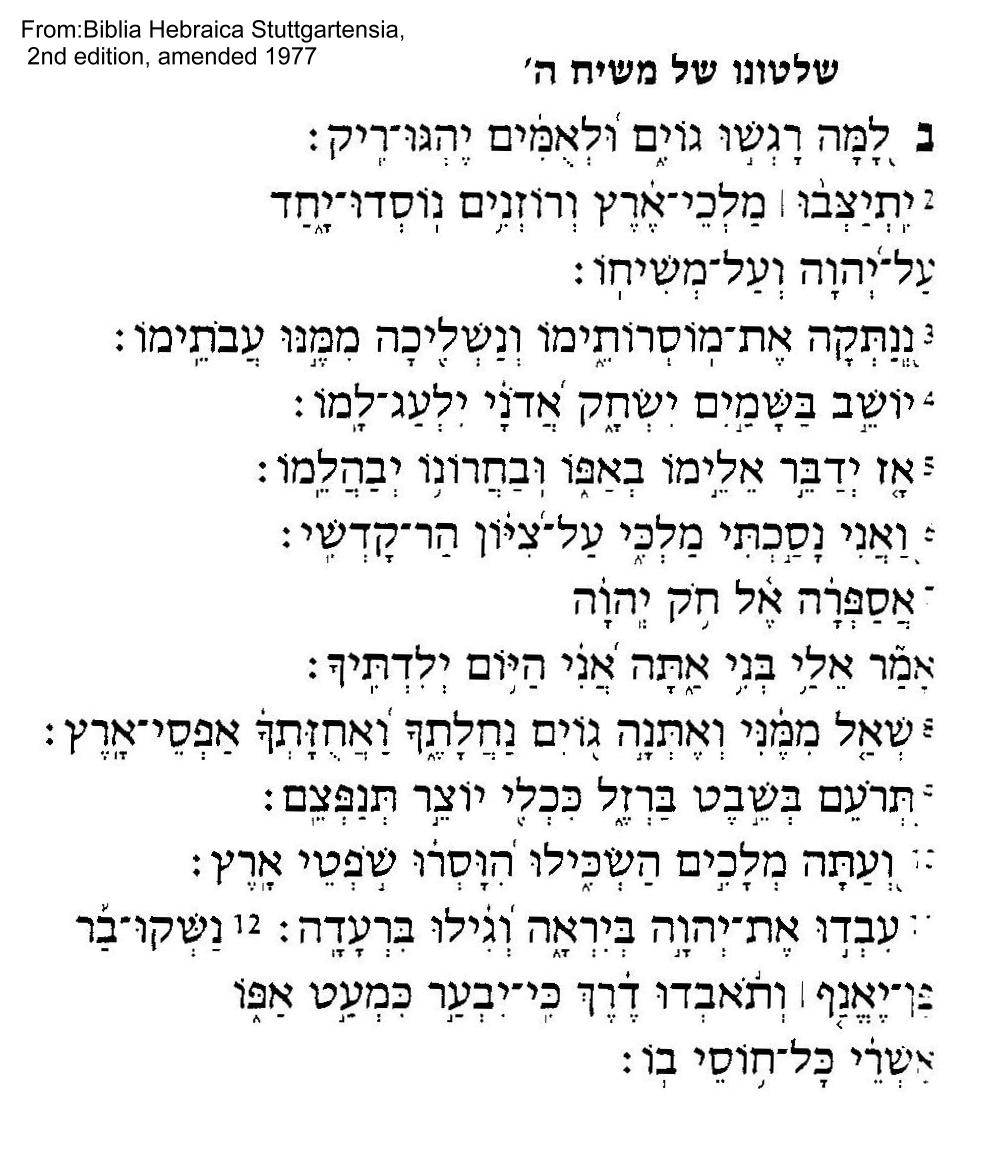
It is likely already obviated that the Hebrew reads from right to left. This unnerving characteristic became most intriguing after I bought my Hebrew Bible. The title page is placed in what we call the very back of the book, as we would say 'preceded by' a table of context giving the Bible book names, chapter counts and page numbers, of which I guessed only the later two because they were Arabic numbers, and even these were given 'backward' with page numbers on the extreme left margin. Again what we call 'preceding' all this was what I perceived to be the first page of the book of Genesis. It was necessary that I pursue this intrigue. And now, seven years later, here I am still in that pursuit but determined to make this 8th year new and grandiose. I still read left to right and pick up my Hebrew Bible either upside down or open to the Revelation of Jesus Christ chapter 22. The intrigue is undiminished. You must read Biblical Hebrew from right to left and rehearse this characteristic in each moment of study.
Learning the pronunciation of the 23 consonants of the Hebrew alphbet is paramount and accomplished by practice, practice, practice. Discerning the letters that look alike, bet and kof, dalet and resh, vaw, zain, and final nun; or the final forms of kaf, mem, nun, pe, and tzade; quickly recognizing the difference between sin and shin; all these are challenges that will only be proceduralized by practice, practice, practice. Reading a little Hebrew daily can be exciting, but a great help is found in watching others in this struggle. While it is available for free online one should take full advantage of eTeacher material, i.e. the 10 free lessons found at http://eteacherbiblical.com/free-lessons (NO LONGER FREE!).. Several verses being read by several students have been captured from their Thursday night Hebrew Webinar found at: https://eteacher.webex.com/mw0307l/mywebex/default.do?siteurl=eteacher (NO LONGER AVAILABLE!).. Many are put in wmv format and available on CD from the author or available at: http://www.gsbaptistchurch.com/hebrew_study_group/scripture/
where you will find:
hbrw_gen1_1.wmv hbrw_gen1_1to3.wmv hbrw_gen9_24.wmv
hbrw_gen11_3.wav hbrw_gen11_3.wmv hbrw_jonah2_1.wmv
hbrw_gen28_1.wmv hbrw_gen28_10.wmv hbrw_gen28_13.wmv
hbrw_gen28_16.wmv hbrw_gen28_18.wmv hbrw_gen28_20.wmv
hbrw_gen28_3.wmv hbrw_gen28_5.wmv hbrw_gen28_7.wmv
hbrw_zech8_11to12.wmv hbrw_zech8_16to17.wmv hbrw_1sam9_11to14.wmv
1It took a while for me as well but HOT stands for Hebrew Old Test.
2Without more research this Hebraica Stuttgartensia is recommended for content of Hebrew with vowel points, not for content of Scripture. According to Jerry Rockwell of firstBible International, via "Unpublished Word", Vol 10, Num 1, Spring 2013, and Bleddyn J. Roberts' “The Old Testament: Manuscripts, Text and Versions” (pgs 10-11) and the “Cambridge History of the Bible”, NY, Cambridge University Press, 1969, the Biblia Hebraica is from the ben Asher Hebrew text, a critical text, and not from the ben Chayyim text that is the basis of the Authorized Version (KJV). In 1524-1525 Jacob ben Chayyim, a Hebrew Christian, put together the Second Rabbinic Bible. The First Rabbinic Bible had disappeared from history and ben Chayyim, like Erasmus for the Greek Text, went seeking evidence of the Hebrew Text, compiling a four volume edition. This Second Rabbinic Bible became the Textus Receptus of the Hebrew, is often called the Masoretic text, and was used by the King James translators. (It was NOT used by the New King James translators else they would not get their copy rights) (You know by now that the prefix 'ben' is Hebrew for 'son of', it is good to study Hebrew) This Hebraica Stuttgartensia, is recommended because of its easy access to Hebrew students and NOT for its certain origins. Be ye careful. I am not yet sure if the Hebraica Stuttgartensia is separate from the Biblia Hebraica family of error. Any input/feedback is herein solicited.
And the LORD said, Behold, the people is one, and they have all one language; and this they begin to do: and now nothing will be restrained from them, which they have imagined to do. Gen 11:6
A nephew who stayed with us had to take speech therapy and when he heard a two year old talk he said, “Boy day need ta take thpeach thaowpy.” If you have you know that a consonant is “A speech sound produced by a partial or complete obstruction of the air stream by any of various constrictions of the speech organs,” and a vowel is “A speech sound created by the relatively free passage of breath through the larynx and oral cavity, usually forming the most prominent and central sound of a syllable.” Remember Biblical Hebrew may have been written with only consonants but it is pronounced with vowels. Subtle changes in vowels are indeed a major part of the communication. To preserve the language the Hebrews carefully devised a series of dots which indicate the vowels a, e, i, o, u. Obviously that cannot allow for all vowel sounds. In Greek they use dipthongs to permanently define all combinations: aisle, eight, oil sauerkraut, soup, suit, feud. The sounds always match the combinations. English should be so kind. When the men refuse to take the refuse we see that English has no good rules. Hebrew will not be as clear as Greek or as challenging as English.
Here is the summary of vowel sounds that we need to learn: (Note that early on it is better to learn the sounds than their names, but their names should some how match their sounds.)
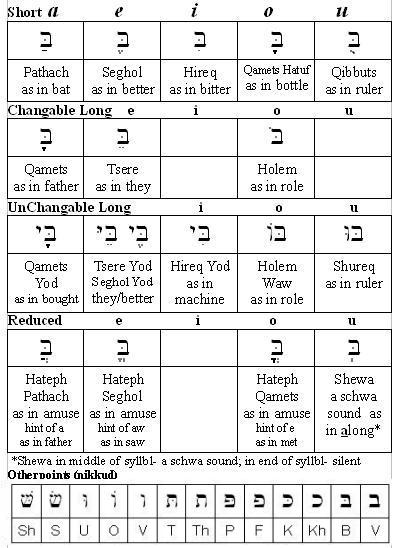
How will you memorize all those vowels? Read a little Hebrew every day. Practice, practice, practice.
Consider some more things about vowels. In all language there will be significant communication done through vowels alone. The speech therapist only considers how one holds their mouth in their formation but a linguist must stop and consider more of their implications. It was said previously that to 'refuse' 'refuse' 1 is confused because of a slight difference in vowel enunciation. So to “the man sang” and “the men sung” illustrates the vowel enunciation that differentiate our singular/plural nouns and our verb tenses. It is an important part of our communication.
These same nuances are present in Hebrew and try to imagine the linguistic challenges found before the Masoretic2 Hebrew set in place the system of Hebrew vowels that we are currently learning. “This system, as has been noted above, although developed by the Masoretic school of Tiberias, is Babylonian in origin, and it may be assumed that it became localized at Tiberias by Babylonian Masorites who settled there “3 The vowel points were standardized in the 4th century but they were not allowed for readings in the Synagog for several more centuries. A better appreciation of their system is found when you consider the goal was a very minimal impact on the 'type set' already adopted for Holy Scripture. This 'typeset' quality of Hebrew Scripture was present in their manuscripts which were set by hand so that every row, every column, and every page had a set number of Hebrew consonants on it to standardize and safeguard the copyists. The Masoretic vowel points could be added without modifying the format of a page of Scripture!
So the Masoretic scribes, and all manuscript scribes, were perfectly delighted with their system of vowel points. It did not modify their Scripture page format, dots and dashes are easily added to scrolls or scribed into clay or plastered tablets, and they gave voice to both long and short sounds of the 5 universal vowels a, e, i, o, and u. Typesetters of the 16th century were not as pleased; nor was Smith Corona the typewriter manufacturer. The computer font designer was not unchallenged in making a could backspace and subscript every vowel. It seems only the Masoretic scribe was pleased with the system of vowel points. Consider their awe as you learn the system, and also consider the linguistic challenge of having no written vowels. Prior to the use of vowel points only the fluent practiced reader of the Hebrew Scriptures knew what he was reading. The system is indeed genius. While adding clarifying points to the text they also went ahead and added some other 'points' (Hbrw nikkud) to clarify pronunciations of other consonants as follows:

While conscious of Hebrew Scripture laid out in rows and columns of well counted letters consider also that there were no blanks left between words in that copying process. With that in mind it is easier to consider why the letters Kaf, Mem, Nun, Pe, and Tsade, have different forms when they come at the end of a word, helping identify many word endings.
Syllabification
This may seem trivial but good Hebrew pronunciation will only be done when the syllables are properly discerned. There are only two general rules: 1) Each syllable begins with a consonant and it contains ONLY ONE vowel. 2) A syllable ending in a vowel is OPEN, the syllable ending in a consonant is CLOSED. Also in Hebrew, as in English it is important to get the em-pha'-sis one the right syl-la'-ble. Take it from one who taught High School for 12 years and Community College for 2.
A vocabulary word from this chapter that illustrates this syllabification is:
d'b'D … meaning 'word' which is syllabified:
D'b ` 'D … (da-bar) each with one vowel, the
first is an open syllable, 'D (da), the second closed D'b (bar).
NOTE: This is also an experiment in your computer's ability to display the BST Hebrew font which may or may not have come embedded in your pdf file and may or may not be installed on your computer. If things worked right the above syllabification explanation will look like this:

Syllabification is not as trivial as I make it out to be here, but it could take weeks of study to discover that truth. We will do more with syllables as we understand the silence or utterance of the Shewa vowel.
1To 'refuse' is a verb saying “No I will not”; but 'refuse' is a noun and another word for garbage. Except for context you cannot tell the difference in the two, nor how the vowels are to be pronounced.
2“The word 'Masoretic' comes form masor a Hebrew word meaning 'traditional.' The Masoretes handed down this text from generation to generation, guarded it and kept it.” Dr. Wait pg 20
3http://www.jewishencyclopedia.com/articles/12441-punctuation accessed 3/20/2013 and 5/28/2021
Go to, let us go down, and there confound their language, that they may not understand one another’s speech. Gen 11:7
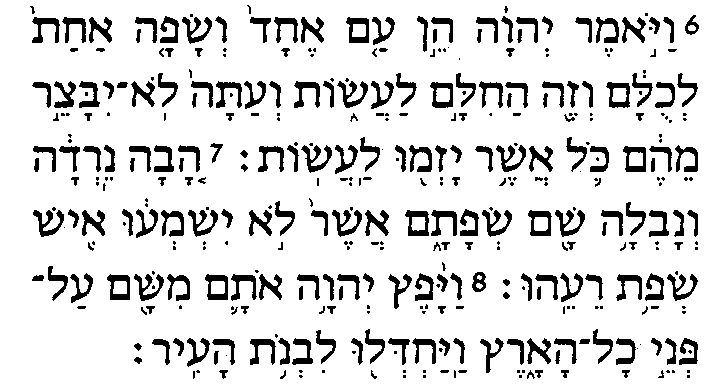
If you can say four ducks but not eight gooses, three places but not six persons, a bunch of humans but not several manses or womans, then you cannot say that Hebrew nouns are “very difficult.” The hardest of all languages to learn is the English language because it has more exceptions than rules. The fun in this effort will be recognizing and learning relatively few exceptions for Hebrew nouns.
To the Biblical Hebrew Study Group; 3/25/2013
Greetings
in the name of the Lord Jesus Christs.
Here we go
into our second week on Hebrew Nouns and I sure need an additional
week. I am not sure I got that simple lesson on syllabification down
yet, let alone figuring out when a Shewa is supposed to be silent!
You might find it hard to believe but sometimes studying Hebrew gets
crowded out of life. That is when I have to reinsert it in the
whee hours of the morning. Sun is just rising here in Upstate NY and
my pencil is sharpened.
I made some tremendous
improvements to the web page. It will include my Hebrew Journal
and all lessons on one page, check it out at
www.GSBaptistChurch.com/hebrew_study_group
Bad links are a common problem in web page construction; if you find
any please ping me.
I sat down on Saturday the
Sabbath day, and took all 10 of the eTeacher's free Hebrew Lessons in
one setting, took about an hour (NO LONGER FREE!).. What an awesome resource.
Try it.
Jesus gave his commission to us five times in Scripture. Always striving to keep the main thing the main thing I rehearse them regularly. Remembering what it required to learn to read the English language for the first time, in my journal I am writing each of those commissions out by hand in English, Hebrew and Greek. When you buy the Biblia Hebraica Stuttgartensia, you find it contains both the Old and New Testament. I found long ago that you learn much in writing, little in typing, and less or nothing in cutting and pasting. Try it, … the writing I mean.
You will hear from
me again on April Fools Day, after our Friday trip to Sights and
Sounds Theater to see "Noah", after the Easter celebration
of our Resurrected Lord, after my MIL returns from wintering in
Alabama, I will be excited to tear into Chapter 5s Conjunctive Waw.
You?
Pastor Ed Rice
There are six points of summary for nouns. In digest they are repeated here:
Unlike anything you find in English, Hebrew nouns have gender and more than one type of plural. Like Greek, Spanish and other languages, Hebrew nouns may be masculine or feminine, rarely both. This has nothing to do with manhood and such, and everything to do with comprehension and inter-connections. Hebrew nouns, like no other, may be singular, plural, or dual.
Masculine singular nouns have no special endings, but plural (2 or more) nouns end with ~yi and the dual (2 only, no more) nouns end with ~iy; .
Feminine singular nouns generally end with h.; , or perhaps with t: `t, `tyi `tW , feminine plural (2 or more) nouns change that ending to tA , and the dual (2 only, no more) end with ~iy; ` ~iy;t .
Much like English there are exceptions to every rule.
Hebrew vowels follow set patterns and plural endings change these patterns.
A Hebrew lexicon (dictionary) lists alphbetically only the singular form called the lexical form. You will not find the endings attached. (nor should you look up a noun's article prefix He for 'the' nor a noun's conjunctive Waw prefix for 'and' , but that is next chapter.)
If you still didn't get that BST font to work check the next page. If you did you may skip the next page, its a replica.
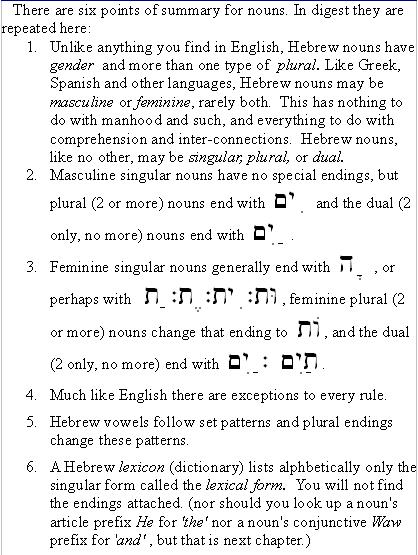
This Intro site is found at www.gsbaptistchurch.com\hebrew_study_group\index.html
If you are not signed up for distribution of this material contact me at PastorRice@GSBaptistChurch.com Subject line Hebrew Study Group
As we grow please recommend this study group to others.
May God
Bless your Efforts
for Him.
Pastor Ed Rice